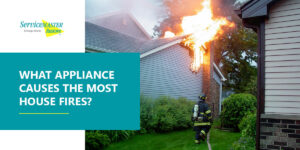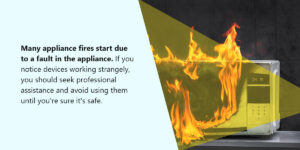
Home appliances are essential pieces of equipment to perform routine activities. From stovetops to cook your food to washers to clean your clothes, your home is filled with devices to make your daily life easier. However, these convenient appliances also pose potential hazards that can lead to house fires. These fires can spread quickly and destroy your property or injure loved ones and pets when you’re not home.
Some of the most common house fire causes are faulty or damaged wiring in home appliances or grease and buildup that collects over time. Knowing what causes most house fires can help you take preventative measures to protect your home and your loved ones from disaster.
1. Cookers
Cookers such as stoves and ovens are the most likely to cause an appliance fire — cooktops and ranges were responsible for 61% of home cooking fires between 2014 and 2018. These appliances most often cause house fires if homeowners leave them unattended or the devices turn on themselves. However, stove and oven fires can start in several different ways.
Splattering grease is a common cause of home fires. Oil or fat that lands on a heating element when you’re making your favorite dish can ignite and start a grease fire. If food bubbles over onto your oven racks, it can burn more each time you use your oven until it finally catches fire.
Pets have caused many stove fires in the past few years by accidentally turning on the appliance without the homeowners’ knowledge. Some homeowners also store items in the oven when it’s not in use and may forget about those items when they go to preheat the oven.
2. Dryers
The chances of a dryer catching fire are higher than you may think. On average, homeowners report 2,900 dryer fires each year. Gas leaks are a common cause of dryer-based fires. Failing to clean your machine can also cause essential components to break down or age quickly.
Additionally, a significant lint buildup can block the vent in the machine, causing it to overheat. When the lint trap is full, your dryer has to work harder to blow the hot air out, and that buildup will slowly make its way to the heating element. Because lint is highly flammable, the building heat will eventually ignite the lint left in the trap.
3. Microwaves
While microwaves can be a great timer saver, they can also be a potential hazard. One of the most common causes of microwave fires is overcooking food. Overheating some ingredients can cause the food to start smoking and eventually catch fire, so keeping an eye on your meals is essential.
Additional causes of microwave fires include:
- Electrical problems: A malfunctioning microwave may turn on when there is nothing inside to cook. Power surges can trick your appliance into turning on, causing it to run until you manually turn it off or unplug it.
- Packaging elements: Metal and plastic aren’t suited for microwave use and can quickly cause fires. You should always be sure to remove food packaging and utensils before warming up a dish.
4. Refrigerators
A cold refrigerator may be a surprise on the list of common appliances to catch fire, but these units run continuously and have many electronic components. When those components malfunction, they can cause a fire:
- Capacitor stress: Refrigerators have a capacitor that stores electrical energy and smoothes out imbalances. When this component experiences stress from humidity, radiation, pollution, overheating or over-voltage, it can trigger a fire.
- Lightbulb overuse: A lightbulb that remains on when the door is closed can lead to overheating as the refrigerator produces extra energy to power the bulb.
- Fan motor or defrost switch failure: The fan motor and defrost switch are two essential components for keeping the refrigerator cool. If one of them fails, the refrigerator can overheat and catch fire.
5. Dishwashers
Dishwashers contain a heating element to dry dishes after completing a wash cycle. Each time you use your dishwasher, the heating elements warm up, get wet and cool down again. Overloading your dishwasher can make it difficult for the heating element to function correctly and cause the unit to overheat, potentially leading to a fire.
Other causes of dishwasher fires include faulty wiring, worn-out electrical cords and a malfunctioning control panel. Leaks can seep into electrical circuits and send sparks flying. Similarly, a frayed cord can start a house fire by sending sparks onto nearby flammable materials.
6. Washers
A washing machine fire can start with large loads of clothing. An overloaded and unbalanced machine will vibrate excessively, which can lead to short-circuiting electrical components. Additionally, a leaking hose can cause a circuit board fire as water sprays out.
If your washer catches fire, unplug the machine to stop the power supply if you can. Using a fire extinguisher on your washer is safe, so be sure to keep one handy in case of an emergency.
Fire Safety Tips

Many appliance fires start due to a fault in the appliance. If you notice devices working strangely, you should seek professional assistance and avoid using them until you’re sure it’s safe.
Keeping yourself and your loved ones safe should always be a top priority. Along with using your appliances safely and ensuring that they’re operating correctly, follow these additional fire safety tips to help avoid fires:
- Invest in a smoke and fire detector.
- Register appliances with the manufacturer.
- Watch for flickering lights or hot plugs.
- Cover greasy foods in the oven.
- Keep flammable objects away from appliances.
- Check cords and wires regularly.
- Clean your appliances often.
- Keep fire extinguishers in each major area of your home.
- Turn off appliances when you leave the house.
- Keep cords out from under rugs.
- Call a professional for repairs.
- Practice fire safety with family members.
- Never use water to extinguish a grease fire.
- Unplug and store small appliances when not in use.
- Test smoke detectors regularly.
ServiceMaster of Lincoln Park Fire Damage Restoration Services
ServiceMaster of Lincoln Park offers fire damage cleanup, mold removal services, and water damage restoration. With over 25 years of experience, we understand the need to restore your home to its former glory, and we want to help you get back to normal as quickly as possible.
Fire safety is the responsibility of every homeowner. However, accidents can still happen even with the greatest care and caution. Appliance fires can be incredibly dangerous and spread quickly. Even after a fire is out, soot and smoke damage can discolor your walls and counters, impeding your home’s aesthetic.
If your home has faced disaster, our professional crew can quickly restore your property to its former condition. Our team is available 24/7 every day of the year, so you never have to wait for a response. Contact us to find out more about our restoration services.

